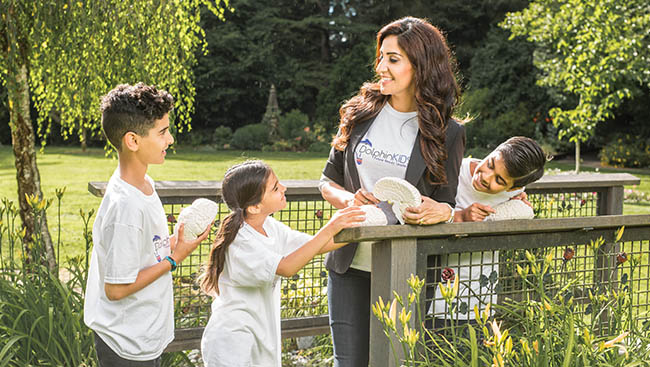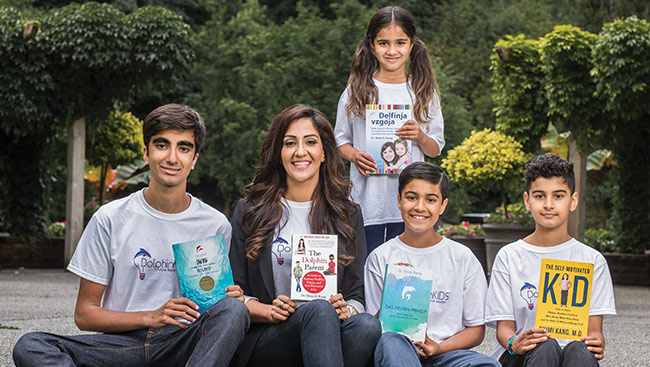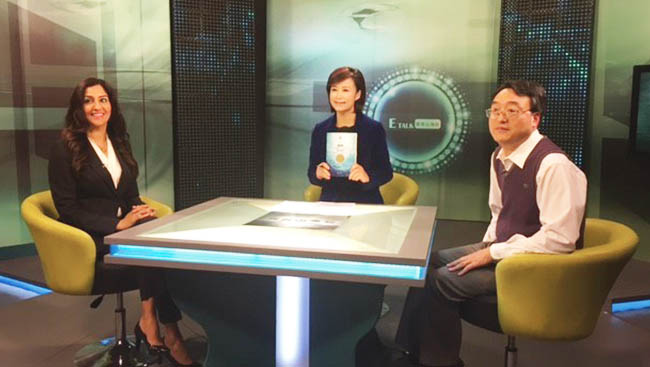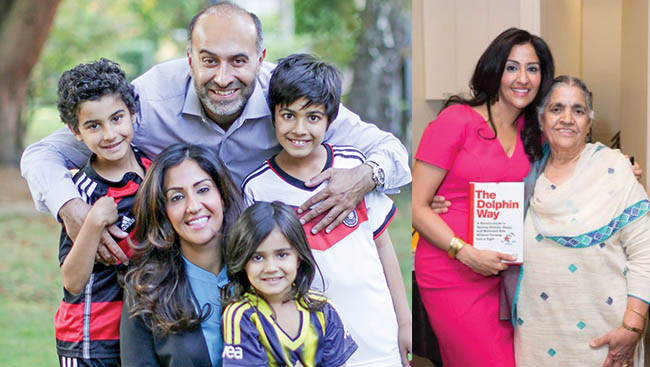An award-winning, Harvard-trained doctor, researcher, media expert, writer, and keynote speaker – Dr. Kang has always taken the unconventional path, and the many roles she plays in the community and through her work is proof of her journey. She describes it as the “road less travelled.” “I have always taken the path that is the least popular or the least conventional,” she says with pride.
It is rare that one is brave enough to take the road less travelled and accomplish great things. Yet, that is not the case for Dr. Shimi Kang – in fact, she is the exception who has achieved a great deal through her work, interests, awards and her commitment to society, and her flourishing journey has still a long way to go. An award-winning, Harvard-trained doctor, researcher, media expert, writer, and keynote speaker – yes, Dr. Kang has always taken the unconventional path and the many roles she plays in the community and through her work is proof of her journey. She describes it as the “road less travelled.” “I have always taken the path that is the least conventional,” she says with pride.
The earliest examples of this is her starting medical school at the age of 19, taking a year off to work internationally, and then opting for psychiatry as her speciality. When deciding what speciality to do in medical school,Dr. Kang was a favourite for competitive, prestigious, and high-paying specialities. But the ambitious doctor chose psychiatry, the speciality called “the orphan of medicine” that many people did not opt for. “I think my journey has always been the right decision for me. It’s made the difference in terms of stretching into new territories, expanding my own awareness, and making an important impact that is desperately needed by society at this moment in time.”
It was, in fact, an internship at the World Health Organization (WHO) in Geneva, Switzerland, during her year off medical school that gave Dr. Kang a closer understanding of mental health. “I was placed in the department of mental health and substance use. It was here that I really saw the worldwide impact of mental health issues,” she recalls.

Upon her return from Boston in 2003, Dr. Kang founded the Provincial Youth Concurrent Disorders Program (PYCD) at BC Children’s Hospital in Vancouver. She is currently also the Medical Director of Child and Youth Mental Health (CYMH) for Vancouver Coastal Health Community Programs, and has a small private practice at False Creek Urgent Care.

PYCD was Canada’s first and largest programme for youth between ages of 11 and 24 with both mental health and substance use problems. “Before this program, young people were turned away and told to stop drinking or using drugs and then come back to deal with issues such as depression, anxiety or ADHD. But teenagers weren’t going to do that, they were self-medicating their symptoms and needed help,” reveals Dr. Kang, who is noted for the innovative and progressive design of the program.
Through CYMH, the medical director oversees many clinics and programs catering from age-two infants to adults. “This position allows me to see the trends that are happening around the world because right now Vancouver is so diverse and has so many immigrants. I can see what’s happening in terms of pressure on children and families through the programs.”
As clearly evident, youth is the main focus among all these programs. “Youth between the ages of 15 and 24 are most likely to suffer from mental health issues than any other time in their lives. The mix of hormonal changes, issues of identity and independence, plus all the current societal pressures such as social media and perfectionism has led to crisis of stress, insomnia, anxiety, depression and addiction,” says Dr. Kang, explaining her interest in youth-related issues, “If we can prevent the beginnings of mental health issues and strengthen balanced lifestyle, values, and character in this age group, we will have a massive impact on the rest of their lives and generations to follow.”
This attraction towards youth issues developed early on for Dr. Kang and hasn’t stopped with just cutting edge academic research and innovative clinical programs. In 2010, she co-founded the Youth, Culture, and Mental Health Fund for the BC Mental Health Foundation. Recognizing the high degrees of stigma and the profound need for mental health education among youth, she turned her efforts towards early identification and intervention in a very public way. She joined the Board of the BC Mental Health Foundation as a Director in August 2011 to further enhance this mission.

Dr. Kang is a Clinical Associate Professor at UBC where her main area of teaching is on motivational therapy and the science behind encouraging and aspiring people to live their best life.
“My research work, started in Harvard University many years ago and continued through UBC and Simon Fraser University, has been on motivational therapy. The key to lasting
health is to motivate people towards healthy lifestyles and change unhealthy behaviours,” shares the Vancouver-resident, on the well-known method she has been researching, training and teaching for over 12 years.
Dr. Kang believes that motivation underlies the fundamental approach to the immense burden of chronic lifestyle diseases such as diabetes, obesity, heart disease, and many mental health issues. “We need to motivate people to take care of themselves, to practise routine sleep and exercise, routine regular social connection, and a balanced diet. These are the basic cornerstones of our health and they are not being valued right now in our current society.”
The tools for this therapy are simple but not easy, something as easy as drinking water but difficult to follow. “So almost 90 per cent of us are chronically dehydrated, it makes us tired, lethargic, irritable, and have poor memory. And knowing is not doing, but thankfully doing leads to being. So if we drink the water, we feel refreshed, better, rejuvenated. My research has been on how do we get people to the doing,” emphasizes Dr. Kang.
Talking about her role as writer, it was the desire to share helpful knowledge that encouraged Dr. Kang to take up this interest. “I realised that the tools I was using were so valuable that the public needed to have them. They needed to be taken out of the professional environment and given directly to parents and teachers, principles and coaches, and people who were working with young people.”

She is the author of The Dolphin Parent: A Guide to Raising Healthy, Happy, and Self-Motivated Kids and The Self Motivated Kid. The Dolphin Parent combines irrefutable science, unforgettable true stories, and Dr. Kang’s own life experiences as a mom of three and the fifth child of immigrant parents. It is the first parenting book to become a #1 National Bestseller and has won the 2015 US News International Book Award in Parenting and Family Category. It has been translated and released in Germany, Russia, and China, and will be released in Slovenia, Korea, Vietnam, and Thailand this year.
In 2012, when her youngest child was two years old, finding everyone she knew, including herself, in a storm of overscheduling, overindulging, and perfectionism, inspired Dr. Kang to develop the concept of the dolphin way. “There was a conflict between what I knew as a professional, what I was doing as a parent, and what I had experienced as a child of immigrant parents who never had the time or money to push or hover over me. Even though I had the knowledge, I realised that when it came to my own kids, I too was getting caught up in what everyone else was doing.”
She adds, “I couldn’t understand why I was having such a hard time rising three kids with all my resources when my own parents successfully raised five kids with much less. All my siblings are hardworking and community-minded professionals including two recently appointed Queen’s Counsels’ lawyers. I couldn’t figure out what my parents’ secret was!”

Analyzing it further, she came to the conclusion that children were being deprived of the simple, intuitive things they need. Among these are three essential activities she calls POD – Play, bond with Others, and have Downtime. “It gave me an awakening that we are really in a crisis. We were focusing more on the outside resume of the child and not on the inside – the creativity, connection, character, and values of the individual.”
She knew, whether as a parent, educator, colleague, or manager, pushing/hovering “tigers” and directionless/permissive “jellyfish” hinder internal drive and adaptability. Dr. Kang thus proposed a powerful new model: the intelligent, strong, joyful, and highly social dolphin. By drawing on the latest neuroscience and behavioural research, she shows how this authoritative style with a balanced lifestyle encourages self-motivation and the key 21st C skills she calls “CQ” – communication, collaboration, critical thinking, creativity, and contribution. “It is the integration of IQ and EQ. After extensive research from the world’s top universities and organizations, these are the five skills that have been identified for 21st C success,” points out the award-winning doctor-writer, who is writing her next book titledCQ: the New Science of 21st Century Success.
The beautiful doc is represented as a national celebrity speaker with the Speaker’s Spotlight Bureau and a TEDx Speaker. She is arecognized media specialist known for discussing both common and complex conditions such as health, lifestyle, motivation, leadership, workplace culture, 21st C skills, and diversity. She has contributed as an invited expert to numerous renowned local and international newspapers, radio shows, and television programs.

The success of The Dolphin Parent is such that Dr. Kang has now ventured into the world of global social entrepreneurship and will be opening the first DolphinKIDS Center in 2017. After reading the book, many parents wanted more guidance on helping their child become more emotionally healthy, self-motivated, and have these 21st C skills. This gave birth to DolphinKIDS: Kids Future-Ready Leaders, Innovation, Leadership and Wellness programmes and centres both in Canada and India. “These centers will include an online curriculum, after-school programmes, and an actual centre where we are teaching the six critical life skills which make success “EASIER”– Emotional wellness, Adaptability, Social leadership including public speaking, Innovation, Ethics/identity and Resilience. These six life skills are the important ingredients of 21st C success,” discloses Dr. Kang, excited about the new venture.
With all that the hard-working South Asian has achieved, it is a given that she has earned numerous accolades along the way. As a result of her endeavours and outstanding community service, Dr. Kang was honoured with the Queen Elizabeth II Diamond Jubilee Medal in 2012, Sikh Centennial Foundation National Award in 2015, and 2016 YWCA Woman of Distinction AWARD for Health and Wellness recently. She has received five national awards in the field of addictions and mental health including the American Academy of Addiction Psychiatry Research Award and an American Society of Addiction Medicine (ASAM) Award. Talking about the Queen’s Diamond Jubilee Award, the proud Indo-Canadian says that “Canada has given me these opportunities and it’s the Canadian values of equality and opportunity that I’m very thankful for.”

